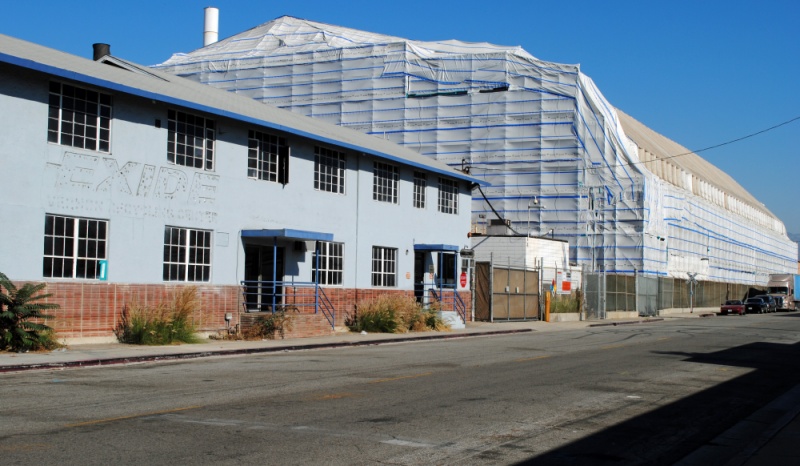Federal approval of plan would allow firm to avoid paying costs for cleanup
By Alfredo Santana
Contributing Writer
VERNON — Residents of Southeast Los Angeles communities and their elected state leaders berated a proposed bankruptcy deal with the federal Department of Justice and the Environmental Protection Agency that would allow battery manufacturer Exide Technologies to abandon its Vernon plant with only a portion of the toxic cleanup costs approved by a federal court in 2015.
During a conference call Oct. 13, nearly 80 residents expressed outrage for four hours, recalled cancer illnesses caused by lead and arsenic exposure, issued catcalls of environmental racism and requested the federal agencies to reject a plan to create a cleanup trust of $2.6 in cash and $26 million in bonds to rid the area of pollutants spewed by the recycling battery plant in Vernon for decades.
Callers requested the federal agencies to hold Exide owners accountable for the chronic illnesses and costs for cleaning up to 10,000 housing units in a 1.7-mile radius from the shuttered plant, which has been accused of spilling tons of pollutants into the mostly Latino inhabited communities of Boyle Heights, East Los Angeles, Huntington Park, Maywood and city of Commerce.
If the Department of Justice agrees to the bankruptcy deal, California would get the clean-up tab, which now sits at $270 million, making it the most expensive environmental cleanup job in the state’s history.
Teacher Roselyn Fernandez, a Boyle Heights resident for 15 years, said that working-class adults and their families would endure more social injustice if Exide’s consent decree and bankruptcy plan stands.
“It would confirm that our communities are subject to environmental racism,” Fernandez said. “This bankruptcy settlement must be unacceptable. It is basically saying ‘hey, we are disposable, and we don’t matter.”
In 2015, Exide agreed to shut down its plant and begin cleaning its grounds as it admitted to committing environmental crimes, while escaping criminal charges for its executives with the condition of demolishing the facility and getting rid of pollutants blown to neighboring residential areas.
The accord with a district court judge was planned to avert a situation where Exide could maneuver a legal exit to liabilities related to environmental cleanup costs in Vernon. Exide has filed for Chapter 11 protection three times, the latter due to the coronavirus, a portfolio of non-performing assets and the Vernon recycling facility.
Exide’s most recent bankruptcy filing was May 19. The company’s properties in the United States were purchased in auction by Atlas Holdings, LLC on July. Headquartered in Miton, Georgia, Exide said on its website that the acquisition comprises businesses and operations for $178.6 million, and “assumes certain liabilities related to the acquired assets.”
The company did not elaborate what liabilities Atlas Holdings would assume.
Michelle Reid, a doctoral candidate in medical science from UC Berkeley and a Huntington Park resident, questioned the ethics and social commitment of Exide as it seeks to walk away from the environmental chaos it created.
“Why is Exide so reluctant to commit to cleaning?” Reid asked. “I am a scientist, and I will commit the rest of my life to ensure companies do not pollute our communities.”
The Exide bankruptcy case prompted U.S. Reps. Lucille Roybal-Allard and Jimmy Gomez to blast U.S. Attorney General William Barr and EPA Administrator Andrew Wheeler’s decision to let the procedures continue, and called both agencies to reject the consent decree and proposed settlement.
“To imagine even for one moment that a corporation like Exide could walk away from the environmental havoc that they have wrecked on my communities is unconscionable,” Roybal-Allard said in a letter. Her 40th Congressional District includes portions of East Los Angeles and most of the cities in Southeast Los Angeles County.
For his part, Gomez blamed the Justice Department for ceding to “corporate polluters like Exide,” and asked to discard the bankruptcy and consent decree agreements to hold them accountable for the “devastation they unleashed on our most vulnerable residents.”
“For far too long, Exide has poisoned communities of color and immigrant communities with toxic contaminants like lead and arsenic, serving as a stark reminder that our fight for environmental justice and racial justice are inextricably linked,” Gomez said.
The letter was also signed by U.S. Reps. Adam Schiff, Grace Napolitano, Maxine Waters and 18 more members of the California congressional delegation.
Maywood resident Felipe Aguirre, director of the Committee for Environmental Justice, said children have suffered from respiratory and other chronic diseases that Exide should be blamed for.
“Exide must be accountable for what they did to our communities. We are the workers who built this factory, and also the workers who built these communities,” Aguirre said.
Art Gonzalez, a 64-year-old cancer patient and East Los Angeles resident, said that “it is not fair for the federal government to let Exide walk out” of this case with minimal liability.
“Lead fumes were spilled over these communities. What is going on here? It is because of racial injustice,” Gonzalez said.
A group of state leaders, headed by Assembly Speaker Anthony Rendon, decried the tentative bankruptcy settlement, and said taxpayers would have to foot an $88 million bill for cleaning lead and arsenic.
“The Department of Justice needs to hold Exide accountable by reinstating criminal proceedings and opposing the option for Exide to abandon the Vernon facility,” said a letter signed by Rendon, and Assembly members Wendy Carrillo, Cristina Garcia and Miguel Santiago. “Between the non-prosecution agreement and this proposed bankruptcy settlement, Exide and its investors will face only minor consequences despite causing hundreds of millions of dollars in damages to the environment and public health.”
Rendon said the state’s Department of Toxic Substances Control estimated 10,000 properties were polluted, in addition to groundwater and surrounding roads. The letter states that pollutants reached “much farther” than 1.7 miles away from the recycling factory.
State Sen. Bob Archuleta, Maria Elena Durazo and Lena A. Gonzalez also endorsed the letter, dated and released on Oct. 6.
The current bankruptcy settlement calls for California to exonerate a liability deal reached with the Department of Toxic Substances as part of the agreement struck on 2015, and excludes the agency from being a trustee in the new financial document.
Gonzalez, whose 33rd Senate District stretches from the cities of Bell to Cudahy, Huntington Park, Lynwood, Paramount and South Gate, said the Exide bankruptcy settlement should be rejected, and vowed to bring charges to Exide owners and make them accountable for polluting poorer communities.
“If the government at the federal level cannot do it, we will certainly do it at the state level,” Gonzalez said. “We cannot let our communities, already wrecked by COVID-19 down. We must hold Exide and its business accountable.”
Currently, the Exide recycling plant on the 2700 block of Indiana St. is covered with plastic sheets and tape to prevent dust with pollutants to escape, while a few maintenance workers and security guards man the offices with a banner advertising they are up for sale due to the bankruptcy.
Exide Technologies’ Europe and Asia-Pacific holdings are not included in the bankruptcy filing of its U.S. operations. The company was founded in 1887, operates in 80 countries and employs more than 8,000 people.
The company recycles and manufactures batteries and energy store systems for automobiles, heavy-duty trucks, marine, mining, military, railroad, telecommunications, utilities, solar panels and other applications.
Tim Vargo, Exide Technologies CEO, said on the company’s website that “under new ownership, our America business will continue delivering high quality energy storage solutions and service to our customers, maximizing future growth and profitability.”











